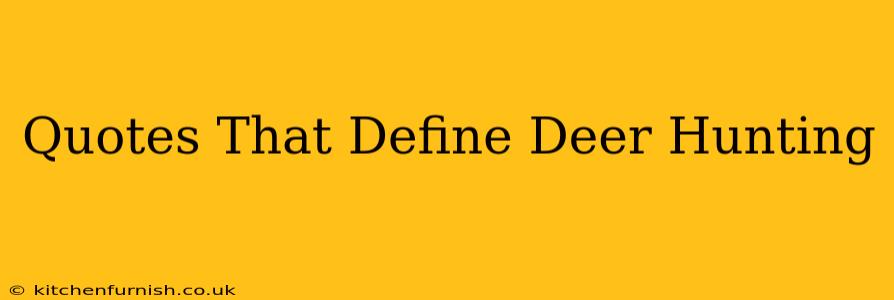Deer hunting, a pursuit steeped in tradition and demanding skill, evokes a unique blend of exhilaration, challenge, and respect for nature. It's a pastime that transcends mere sport; it's a connection to the wild, a test of patience, and a harvest that feeds both body and soul. This exploration delves into the essence of deer hunting through a collection of powerful quotes that capture its many facets. We'll examine what makes these quotes so resonant and explore the deeper meanings they convey.
What Makes a Great Deer Hunting Quote?
A truly great deer hunting quote doesn't just describe the activity; it evokes it. It captures the feeling of anticipation in the pre-dawn chill, the intense focus during the stalk, the quiet satisfaction of a successful hunt, and even the respect shown to the animal taken. The best quotes often encapsulate the ethical considerations, the connection to nature, and the deep-seated traditions associated with this challenging and rewarding pursuit.
Exploring the Essence of Deer Hunting Through Quotes:
Here are several quotes that capture different aspects of deer hunting, followed by analysis to unpack their meaning:
"The thrill of the hunt is not in the kill, but in the chase." This quote speaks to the inherent challenge and excitement of the pursuit itself. It highlights the patience, skill, and strategy involved in tracking and outsmarting a wily deer. The focus is on the journey, the anticipation, and the mastery of the craft rather than solely on the outcome.
"Respect the animal, respect the land, respect the tradition." This quote emphasizes the ethical dimensions of deer hunting. It reminds hunters of their responsibility to treat the animal with dignity, to minimize their impact on the environment, and to uphold the heritage and principles of ethical hunting practices.
"Hunting is not a sport, it's a craft." This statement elevates hunting beyond mere recreation. It emphasizes the skill, knowledge, and experience required for success. It demands understanding of animal behavior, tracking techniques, weather patterns, and the nuances of the landscape.
"The woods are lovely, dark and deep, But I have promises to keep, And miles to go before I sleep, And miles to go before I sleep." - Robert Frost While not explicitly about deer hunting, this famous poem resonates deeply with hunters. The "promises to keep" can be interpreted as the commitment to the hunt, the long journey involved, and the dedication required to achieve success. The "miles to go" represent the endless pursuit of perfecting one's skills and deepening one's connection with the wild.
Frequently Asked Questions (FAQ):
Q: What is the most important aspect of deer hunting?
A: The most important aspect is a balance of skill, ethics, and respect. Skill involves understanding deer behavior, tracking, and marksmanship. Ethics demand responsible hunting practices, respecting the animal and the environment. Respect shows itself in proper handling of the harvested animal and appreciation for the natural world.
Q: Is deer hunting dangerous?
A: Deer hunting, like any outdoor activity, carries inherent risks. These include accidental injury from firearms, exposure to the elements, and encounters with wildlife. Safety is paramount, and proper training, equipment, and awareness are crucial to mitigate risks.
Q: What are some key skills needed for deer hunting?
A: Essential skills include: tracking and scouting, understanding deer behavior and habitat, firearm safety and marksmanship, and field dressing and processing game. Physical fitness and patience are also invaluable assets.
Q: Is deer hunting sustainable?
A: Responsible and regulated deer hunting plays a vital role in wildlife management and population control. It helps to maintain healthy deer herds and prevent overgrazing, thereby supporting biodiversity and ecosystem health. Ethical hunting practices and adherence to regulations are crucial for sustainable hunting.
Q: What is the role of tradition in deer hunting?
A: Deer hunting is deeply entwined with tradition and cultural heritage. It represents a connection to the past, the transfer of knowledge and skills from generation to generation, and a way to experience a strong bond with nature and the community of hunters.
In conclusion, the quotes above and the discussion surrounding them highlight the multifaceted nature of deer hunting. It's not simply about the kill; it's a complex tapestry woven from skill, ethics, tradition, and a deep respect for the natural world. This understanding is vital for any aspiring hunter or anyone seeking to appreciate the rich history and significance of this challenging and rewarding pursuit.

